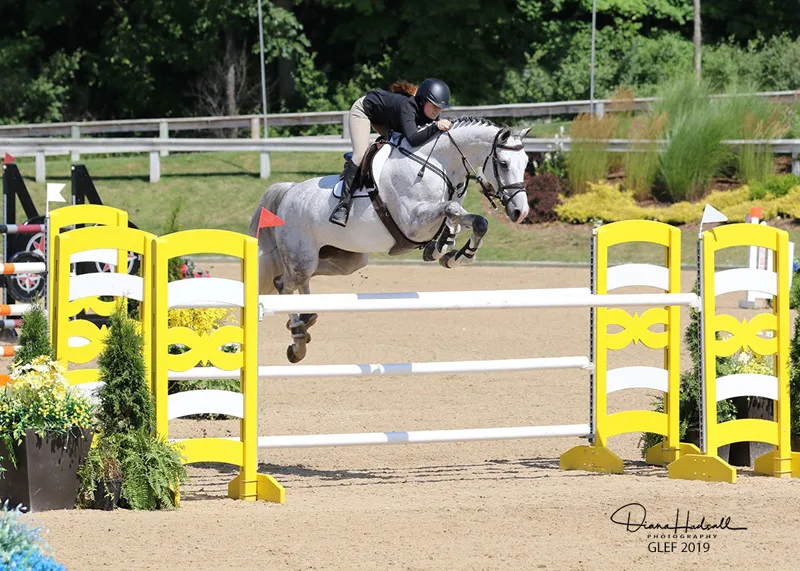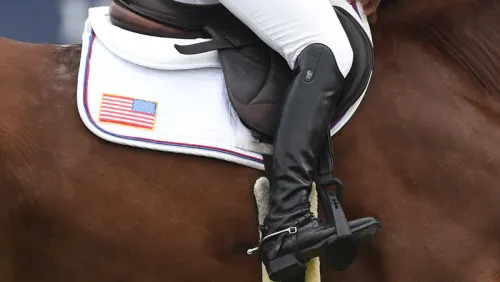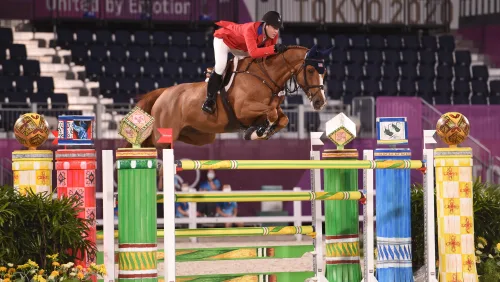When Kamille Marcussen returned to the saddle in July of 2019 after a three-week hiatus, few of her barn friends knew where she’d been, much less why she had a gauze bandage taped to her neck.
Since her thyroid cancer diagnosis in June, she’d been keeping it quiet.
“I’m always really happy-go-lucky, always really positive,” Marcussen said. “For someone to ask how I was doing and not be able to say, ‘I’m great!’ that was just too draining for me. I didn’t want to drag people down.”
Marcussen, 23, had been applying sunscreen on a hot spring day in Tryon, North Carolina, when she found a small lump under her chin. She didn’t think much of it; she was in the midst of arranging a flight to Europe for herself and a string of Kristen VanderVeen’s jumpers. The plan was that after she delivered the horses to VanderVeen in Europe, Marcussen would take over training and riding duties at the farm Stateside—her biggest break since leaving her home in Iowa to be a working student in Florida at 15 years old.

Kamille Marcussen started riding Cancun while she was working for Christian Hess in Germany, and now she’s hoping to do the U25 classes with him. Shawn McMillen Photography Photo
But the lump didn’t go away, and her parents, both physicians, pressed her to schedule an appointment before leaving for Europe.
Three days before wheels up, the doctors told her it was cancer.
“It sounds crazy, but it didn’t seem that important,” Marcussen said. “I was much more worried about talking to Kristen—that was my anxiety right off the bat. I’m going to let my team down; I’m going to let the horses down! Once we got everything situated with the trip and the horses, the long term of what was on the table started to sink in.”
Marcussen’s parents handled most of the scheduling and decision making around her treatment plan. Papillary thyroid cancer is the most common type of thyroid cancer and responds well to treatment.
Still, there was only so much she could ignore.
“Before the surgery, I was pretty scared,” Marcussen said. “I had never been under anesthesia before, and I knew there were a couple tricky spots where the cancer had wrapped around my vocal cords that the doctors were worried about. I was pretty scared of losing my voice. There were so many unknowns.”
Though it was unlikely Marcussen would completely lose the ability to make sounds, depending on how the surgery went, it could drastically affect the functionality of her vocal cords.
ADVERTISEMENT
“I never thought I wouldn’t ride,” she said. “It was more, how much harder is it going to be? How much longer is it going to take?”

Kamille Marcussen taking her first steps following surgery to remove her thyroid. Photo Courtesy Of Kami Marcussen
Her early recovery did not go well. The surgery took twice as long as expected, but they saved her vocal cords. However, the physical and mental tolls were severe. She’d flown home to Iowa City, Iowa, for the surgery, and her parents took care of her in the following weeks. She withdrew from her family, growing quiet and disengaged. It was hard to be in a house that hadn’t been her home since her early teens. It made the cancer feel like exactly what she had refused to believe it could be: a career-altering setback.
She had a ticket back to Tryon scheduled for three weeks after the operation, but an infection flared in a drain in her neck and nearly required additional surgery. Her doctors recommended she cancel her trip.
Instead, her mom packed a bag.
“As much as they didn’t love the idea of sending me into a dirty barn with an infected hole in my neck, they were so supportive,” Marcussen said with a laugh. “I think they’d seen how much the horses meant to me, and they knew how hard it is to be weak and out of your element and not to have the things that give you comfort. I wasn’t acting like myself. So, my mom flew out with me and stayed until I could do the dressing changes on my own.
“I don’t think we ever told the surgeon, either, but what he doesn’t know can’t hurt him,” Marcussen joked.
Back in the barn aisle, Marcussen rebounded quickly. She drove to Michigan for two weeks of competition five weeks post-operation and, other than a little light-headedness, managed the event just fine. She even rode in her first 1.40-meter grand prix with her 10-year-old Holsteiner gelding, Cancun (Cancara—La Musica, Corrado 44), at the end of the second week.

Kamille Marcussen got back into the ring with Cancun only a few weeks after surgery. Diana Hadsall Photo
But getting back in the tack didn’t solve everything. The surgeons had removed her entire thyroid and replicated its functioning with Synthroid, a thyroid hormone replacement therapy that can take years of tweaking to get just right. In order to suppress the cancer’s regrowth, Marcussen’s treatment required an overdose of Synthroid, which can lead to negative side effects like depression, anxiety, weight loss and fatigue.
Marcussen started having panic attacks, sometimes right before entering the arena. As she tried to calm her heart rate, she felt as alarmed by the strangeness of the new emotions as by the physiological changes.
“I’ve always been a type-A person, a little OCD with a lot of perfectionist tendencies,” Marcussen said. “I’d sometimes get anxiety over wanting to do everything correctly, especially with my job. After the surgery, though, things got so much harder. I don’t like to make excuses for myself, so I would tell myself, it’s not the Synthroid; you just have to work harder. I was fighting so hard for it to be normal. I wasn’t able to acknowledge that my normal was gone.
“I realized I was really putting too much pressure on myself,” she added. “Mentally, I just needed a minute more than normal. I had to figure out how to handle those emotions that I could not keep back, no matter how hard I tried.”
ADVERTISEMENT
As she worked to adapt to the challenges post-surgery, Marcussen learned she’d also need to update her life plan. After a week of radiation therapy a few months post-surgery, VanderVeen told her she was drastically reducing the size of her North American operation.
The job Marcussen hoped to graduate into was gone.
“It’s the business, things change,” Marcussen said. “Kristen actually connected me with Michael [Morrissey], who happened to be looking for someone right around that time.”
She couldn’t find the word for her job with Morrissey—organizing the schedule, making grain, completing entries, filing passports, and riding six-to-eight training horses a day. It’s demanding but just the kind of jack-of-all-trades position where she thrives.
Little by little, Marcussen has learned to recognize, feel and move on from the flaring emotions that come with her Synthroid dosing, and to stop blaming herself when they occur. She and Cancun are prepping for their first full season at the grand prix level next year, with hopes of a competitive run in the U25 division in Wellington, Florida.
The cancer hadn’t grown back as of August, and, to Marcussen’s relief, she doesn’t have to go in for another appointment for six months.
Best of all, if you ask her how she’s doing, she’s back to her characteristic answer.
“Right now, I’m great!” Marcussen said. “There’s a quote I love, ‘Do not let the world make you hard.’ It’s so easy to be critical of yourself and to watch other people your age and compare. It can really hurt you and drain you. Things can change really fast. You have to have the faith that even though it’s not right in this moment, it will turn around.”
Do you know a horse or rider who returned to the competition ring after what should have been a life-threatening or career-ending injury or illness? Email Kimberly at kloushin@coth.com with their story.















